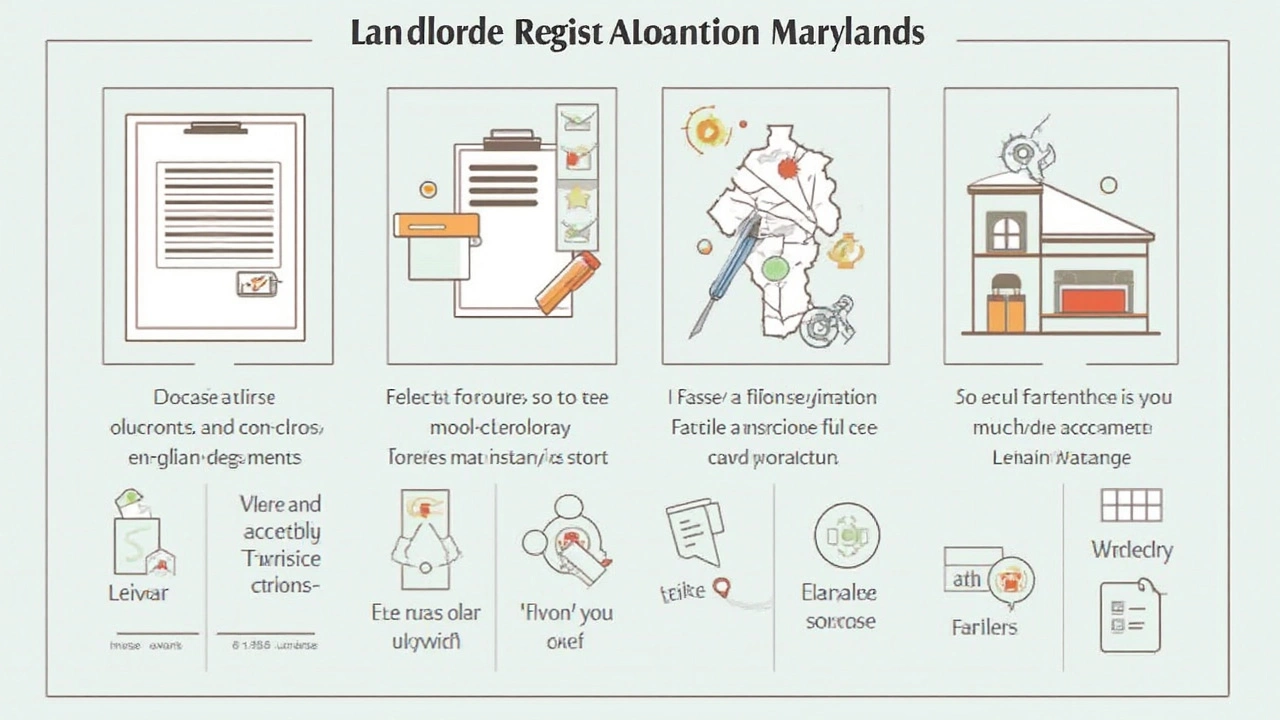Do You Need to Register as a Landlord in Maryland?

Apr, 3 2025
So, you're a landlord in Maryland, or maybe you're thinking about becoming one. Either way, knowing the ins and outs of registering as a landlord might not be the most glamorous part, but it's super crucial. In Maryland, landlord registration isn't just about ticking off a box—it’s about staying in line with the law and ensuring your rental business runs smoothly.
First things first, do you actually need to register? In some counties in Maryland, you definitely do. Baltimore City and Prince George’s County, for instance, require landlords to register their rental properties. Skipping this step isn't just risky legally, it might cost you big if any issues come up with tenants.
Registering typically involves filling out a form, paying a fee, and sometimes providing a lead inspection certificate if your property was built before 1978. Don't worry, it's not as daunting as it sounds. There are clear instructions available, and many local government websites make the process pretty straightforward. Plus, registering can increase trust with your renters, which is always a good thing!
- Understanding Maryland's Landlord Registration
- Steps to Register as a Landlord in Maryland
- Benefits of Registering with Local Authorities
- Tips for Smooth Property Management
Understanding Maryland's Landlord Registration
Alright, so you've got a property in Maryland and you're considering renting it out. Before you start playing landlord, it's key to understand the landlord registration requirements in the state. Not every county in Maryland demands registration, but several do. Let's not turn a blind eye to this—it’s all about doing business the right way.
In some areas like Baltimore City and Prince George's County, registering your rental property is non-negotiable. Why? Well, it helps track landlords, ensures compliance with local housing laws, and most importantly, keeps tenants safe. It’s also worth remembering that failing to register could mean penalties, fines, and even trouble evicting tenants if things ever get messy.
So what does registration actually involve? You typically need to provide basic info about yourself and the property, cough up a registration fee, and if your place was built before 1978, show a lead paint inspection certificate. This isn’t just paperwork for paperwork’s sake—lead poses serious health risks, especially for kids, so authorities are pretty strict about it.
And here's something that could be handy for you: Baltimore City, being ahead of its time, has electronic registrations available. You can hop online, fill out your details, and you're good to go without leaving your couch.
| County | Registration Required | Lead Inspection Required |
|---|---|---|
| Baltimore City | Yes | Yes, if pre-1978 |
| Prince George's County | Yes | Yes, if pre-1978 |
| Montgomery County | Generally No | Yes, if pre-1978 |
Getting everything registered may sound like a hassle, but it’s like putting on a seatbelt—it keeps you safe. Plus, being a legit landlord could make tenants more comfortable signing that lease! So, check with your local county’s rules and knock out any registration requirements before getting in over your head.
Steps to Register as a Landlord in Maryland
Getting your feet wet in the rental game? Here’s what you need to do to get officially recognized as a landlord in Maryland. It's not too complicated, but there's a process to follow. Let’s walk through it together.
- Determine if Registration is Required: Before diving in, check local requirements. While Baltimore City and Prince George’s County require registration, not every county does. Always start by visiting your local government’s website or giving them a call. It's worth the peace of mind.
- Gather Necessary Documents: You’ll need a few things handy. Typically, this includes a completed registration form, proof of ownership, and a lead inspection certificate for older properties. If your property was built before 1978, Maryland law requires this inspection because of potential lead paint hazards.
- Submit Your Application: Head online to find the application forms. Nowadays, most counties have shifted to online portals, making submission a breeze. Fill out the form accurately with all necessary details about the property and your landlord information.
- Pay the Registration Fee: Fees can vary depending on your property's location and size. Check the local rates. It’s usually a modest fee, but don’t skip this part. It helps keep your registration legit.
- Receive Your Landlord License: Once you've submitted everything, it’s just a waiting game. Maryland’s diligent in processing applications, so it shouldn’t take too long. You’ll get a confirmation or license, which you should keep with your rental records.
For peace of mind, always double-check your local county’s specific rules since they can have unique requirements. Registering not only keeps you in legal compliance but helps maintain trust and transparency with your tenants. A little paper trail goes a long way!

Benefits of Registering with Local Authorities
Registering your rental property with local authorities in Maryland isn’t just something you can check off your to-do list. It actually comes with real perks that can make your life as a landlord a lot easier. If you’re renting property in places like Baltimore City or Prince George’s County, this step is crucial for keeping everything legit.
First and foremost, by registering, you make sure you’re following the landlord requirements in Maryland. This means you're less likely to run into legal headaches down the road. No one wants surprise fines or penalties, right? Staying compliant can save you from hefty fees and keep your rental business thriving.
Another big plus is that registering can improve relations with your tenants. They know you're a serious, trustworthy landlord who follows rules. It can lead to fewer disputes and might even make it easier to find great tenants—people appreciate a smooth renting experience. It’s good for them; it’s good for you.
Plus, local registration often gives you access to resources and support from government agencies. Whether it’s guidance on managing landlord-tenant laws or getting the lowdown on property tax breaks, being officially registered keeps you in the loop.
Property management in Maryland doesn't have to be a hassle if you're proactive. By keeping up with local registration requirements, you’re setting the stage for a successful rental business. And hey, if there are ever changes in the law, being registered means you’ll get updates directly from the source. No need to scramble for info.
In short, registering with the local authorities is your ticket to a smoother, more reliable renting journey in Maryland. It’s not just about compliance; it’s about building a reputable and well-oiled rental enterprise.
Tips for Smooth Property Management
Managing rental property without losing your mind isn't just a dream—it’s totally doable if you know a few critical tricks. Let’s talk about how you can keep things running as smooth as butter.
First off, prioritize communication. Keeping an open line with your tenants means fewer headaches down the road. Use email or apps like Cozy or Avail to keep everything organized. Tenants appreciate responsiveness and clarity, so make it easy for them.
Another key is staying on top of maintenance. Regular checks to ensure everything's in working order can save you from big repair expenses later. As they say, "An ounce of prevention is worth a pound of cure." Installing energy-efficient appliances can also slash utility bills.
"A well-maintained property not only attracts good tenants but also keeps them," said John Smith, a renowned property management advisor at the National Association of Residential Property Managers.
It's also smart to understand local laws and your responsibilities. Knowing the rules on property management in Maryland and your rights as a landlord is crucial. Maryland has strong tenant protection laws, so make sure you’re compliant to avoid penalties.
Consider using property management software. It can automate rent collection, track expenses, and remind you of important dates. This minimizes human error and frees up your time for more important tasks.
Renting to reliable tenants is half the battle won. Do thorough background checks and credit scores to avoid surprises. Once they’re in, building a good relationship helps ensure timely rent payments.
- Screen tenants diligently.
- Keep your properties well-maintained.
- Embrace digital management tools.
- Stay updated with local landlord-tenant laws.
- Keep an emergency fund for unexpected repairs.
The devil's in the details, but nailing them makes property management in Maryland a breeze. With these practical tips, not only will you enjoy fewer hiccups, but you'll also build a reputation as a reliable landlord.